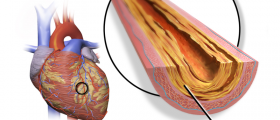
About High Cholesterol
Cholesterol is a substance normally found in the blood and it is essential for building healthy cells. Still, if there is an excess of cholesterol in the blood and its levels remain increased for a longer period of time this may eventually cause serious medical conditions. Namely, excess of cholesterol forms fatty deposits in the blood vessels and participates in the process of atherosclerosis. These deposits narrow the blood vessel and cause insufficient supply with blood and all essential nutrients. Decreased blood flow is responsible for various damage to different organs. Heart attack and stoke are only two out of many conditions that develop due to excess of cholesterol and formation of fatty deposits.
Even though susceptibility to high cholesterol may be inherited the optimal level of cholesterol can be maintained and complications associated with hypercholesterolemia can be prevented. Increased level of cholesterol does not cause any symptoms or signs. It is most commonly discovered during routine blood biochemistry tests.
In blood, cholesterol is attached to specific proteins and such combination is known as a lipoprotein. Depending on the type of cholesterol there are different lipoproteins. Low-density lipoprotein (LDL) is "bad" and its excess leads to accumulation of fatty deposits in the arteries. Very-low-density lipoprotein (VLDL) contains triglycerides and it allows LDL cholesterol to enlarge in size hence it supports blood vessel narrowing. And finally, high-density cholesterol (HDL) is considered as "good" since it is in charge of removal of the cholesterol from the blood into the liver.
Therapy for High Cholesterol
Hypercholesterolemia is treated with lifestyle changes and medications.
A well balanced diet, restricted intake of all food products that contain cholesterol and physical activity are initial treatments for high cholesterol. However, if they do not provide with desirable effects and hypercholesterolemia lingers the doctor opts for medicamentous treatment.
Statins are most commonly prescribed drugs to patients suffering from high cholesterol. They act by blocking proper synthesis of cholesterol in the liver. The liver takes the necessary cholesterol from the blood and its level consequently decreases. Furthermore, bile acid sequestrants bind certain components of bile in the intestine and interrupt enterohepatic circulation of bile acids not allowing them to be absorbed. By doing so these medications act as hypolipidemic agents. Cholesterol absorption inhibitors prevent absorption of cholesterol in the small intestine. Some of the drugs can even be combined. If a person additionally suffers from excess of triglycerides he/she may be prescribed with fibrates, niacin or omega-3 fatty acid supplements. Intake of the previously mentioned medications requires proper control of liver enzymes and generally requires a pause after a certain period of time.

















Your thoughts on this
Loading...